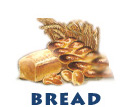|


The importance
of diet in the preservation of health was recognized by the Rabbis, and the
Talmud has many passages which deal with articles of food that are wholesome
or otherwise. Bread seems to have been literally the staff of life.
Thirteen things are said concerning bread eaten in the morning.[1]
Bread will:
|
protect
you from the heat;
protect
you from the cold;
protect
you from injurious spirits;
protect
you from demons;
make you
wise if you are simple, and help you win a lawsuit;
help you
learn and teach Torah;
cause your utterances
to be listened to;
cause your
learning to remain with you;
ensure
that you breath does not exhale a bad odor;
ensure that
you are attached to your wife and do not lust after other women;
destroy
all tapeworms in your system;
drive forth
envy; and
cause love
to enter.
|
|
The intention
is that if a man starts the day with a nourished stomach, he will be able
to think more clearly and do his work efficiently; it will also put him into
a cheerful frame of mind. The same thought is expressed in the remark: "Before
a man eats and drinks he has two hearts: after he has eaten and drunk he has
but one heart."[2]
In the Hebrew system of psychology "heart" is the seat of intelligence; and
the saying indicates that an empty stomach has a disturbing effect on the
mind and interferes with concentration of thought.
The bread should be made of fine wheat flour. "Barley flour is injurious by
creating tapeworms."[3]
It should also be eaten cold: "There is a saying in Babylon that hot bread
has fever by its side."[4]
Great stress is laid on the advice that to derive the fullest benefit from
eating bread, salt must be added to it and water drunk after it. Salt and
water are indispensable to life: "The world can exist without wine but not
without water. Salt is cheap and pepper dear; the world can exist without
pepper but not without salt."[5]
The rule advocated is: "After every food eat salt, and after every beverage
drink water, and you will not come to harm [through illness]. He who has partaken
of any food without eating salt, or drunk any beverage without drinking water,
will be troubled during the day with a bad odor in his mouth and at night
with croup."[6]
One Rabbi counseled: "He who makes his food float in water [by drinking a
large quantity of water with his food) will not suffer from indigestion. Another
stated: "There are eighty-three diseases connected with the bile which can
be counteracted by eating bread with salt in the morning and drinking a jug
of water."[7]
Bread and salt constituted the ordinary meal of the poor, both morning and
evening. Meat was regarded as a luxury and must have been seldom tasted by
the poor classes. The bulk of the people lived mainly on a vegetarian diet,
and several Talmudic discussion debate the wholesomeness of a diet whose staple
food is vegetables. One passage declares: "Woe is the body through which vegetables
keep constantly passing,"[8]
meaning a body whose staple food is vegetables.
Supporting one particular opinion that vegetables are harmful when eaten uncooked,
another passage reads: "A disciple of the Sages is not allowed to reside in
a city where no vegetables are to be had. From this is to be inferred that
vegetables are wholesome, but there is another teaching: Three things increase
feces, reduce stature and take away a five-hundredth part of the light of
a man's eyes: bread made of coarse meal, freshly-made intoxicating liquor,
and vegetables!"[9]
In the parallel version,[10]
the reading is "raw vegetables" and the text continues: "three things decrease
feces, raise the stature and bring light to the eyes: bread made of well-sifted
flour, fat meat and old wine."
*
* *
So there you have it folks,
the unbeatable Talmudic recipe for a healthy mind and body. Let's summarize:
- Be sure to eat bread
every morning;
- Eat your bread with salt
and a jug water.
- Make sure it's of fine,
well-sifted wheaten flour (not barley);
- Eat your bread with well-cooked
vegetables, and with fat meat... although, er....you know, it really couldn't
hurt to get a second opinion.
|
|
|
|